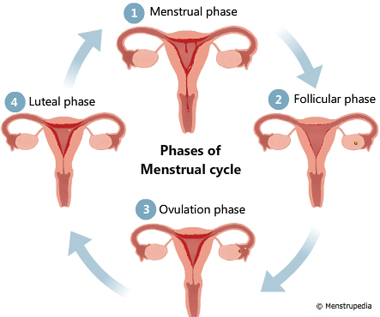Understanding how the menstrual cycle affects your body can greatly enhance your fitness journey, helping you tailor your workout and nutrition plans according to your body’s needs.
Here’s a detailed overview of the menstrual cycle and its impact on hunger, strength, mood, and sleep, along with informative images to guide you through.
The Menstrual Cycle Overview
The menstrual cycle can be divided into four main phases, each characterized by specific hormonal fluctuations:
- Menstrual Phase (Days 1-5):
- Hormones: Low levels of estrogen and progesterone.
- Hunger: You may experience decreased appetite initially due to prostaglandin production, which can also cause menstrual cramps.
- Strength & Mood: Energy levels might be low, and you might feel tired or have mood swings. It’s a good time for light exercise or rest.
- Sleep: Some may experience difficulty sleeping due to cramps and discomfort.

- Follicular Phase (Days 1-13):
- Hormones: Estrogen rises as an egg prepares to be released.
- Hunger: Appetite might start to normalize or slightly increase.
- Strength & Mood: As estrogen increases, so does your energy, strength, and mood. It’s a great time for high-intensity workouts.
- Sleep: Improved sleep quality as estrogen has a positive effect on REM sleep.
- Ovulation (Day 14):
- Hormones: A sharp increase in estrogen and luteinizing hormone; the egg is released.
- Hunger: You may experience a spike in appetite and cravings due to the surge in hormones.
- Strength & Mood: High energy levels make it ideal for challenging workouts. Some may feel a boost in mood and libido.
- Sleep: Some may experience disturbances in sleep patterns due to hormonal peaks.
- Luteal Phase (Days 15-28):
- Hormones: After the egg is released, progesterone rises along with estrogen.
- Hunger: Increased appetite and cravings for carbs and sweets due to higher progesterone.
- Strength & Mood: You may start feeling more fatigued and experience PMS symptoms like mood swings. Adapt workouts to how you feel.
- Sleep: Progesterone can cause sleep disturbances or make you feel more tired.
Adapting Fitness & Nutrition
- Menstrual and Follicular Phases: Leverage the increase in energy and strength to focus on progressive overload and high-intensity workouts. In addition, keep nutrition balanced, and gradually increase caloric intake as your appetite returns.
- Ovulation: Take advantage of your peak strength to hit personal bests. Monitor your appetite to manage cravings effectively.
- Luteal Phase: Focus on moderate intensity and restorative exercises like yoga or swimming. Make sure to also increase complex carbs and maintain hydration to manage cravings and support energy levels.
As you navigate through your menstrual cycle, consider how each phase impacts your body. Adjusting your workouts and nutrition to align with these changes can also help optimize performance, recovery, and overall well-being. Tune into your body’s signals and adjust your workout regimen as needed to reach your health and fitness goals.
Author: Mel Cech



